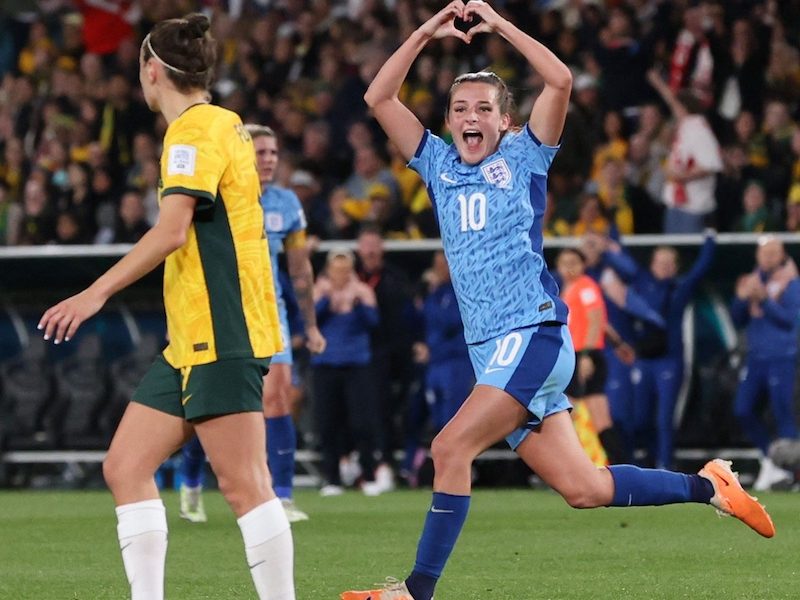
Photo credit Sky News
Firstly, double congratulations to the England Lionesses who today beat Australia 3-1 in the Women’s World Cup semi-finals. They made history after becoming the first English side since 1966 to make it to the world stage. They now face Spain in the final on Sunday, good luck!
The rise of women’s football has been a significant and positive development in the world of sports.
Over the past few decades, women’s football has experienced substantial growth in popularity, visibility, support and challenging gender stereotypes.
Women’s football, a captivating and dynamic sport, has surged to the forefront of the global sports landscape. With skill, determination and a passion that knows no bounds, female athletes have shattered stereotypes and barriers, showcasing their remarkable talent and contributing to the evolution of football.
The journey of women’s football, once marked by obstacles and inequalities, has transformed into a compelling narrative of triumph over adversity. As the sport gains recognition and respect, it stands as a symbol of empowerment, inspiring generations of young girls to chase their dreams and embrace the beautiful game.
From grassroots leagues to international arenas, the dedication and commitment of women footballers have ignited a revolution and redefined traditional notions of athleticism. It has proved that the spirit of competition knows no gender. As the world unites to celebrate the prowess of these exceptional athletes, it’s clear that women’s football is not just a sport – it’s a movement, a source of unity and a testament to the limitless potential of human endeavour.
Here are some key factors that have contributed to the rise of women’s football:
Increased visibility and media coverage
One of the critical factors in the rise of women’s football is the increased visibility it has received through enhanced media coverage. Major tournaments like the FIFA Women’s World Cup, UEFA Women’s Championship and domestic leagues have gained more airtime and coverage. This has allowed fans to follow and support women’s teams and players.
Investment and sponsorship
Growing interest from corporate sponsors and investors has led to increased financial support for women’s football. This investment has allowed for better facilities, coaching and overall development of the sport. Resulting in higher-quality competitions and increased participation.
Growing participation
More girls and women are participating in football at various levels, from grassroots to professional. The accessibility of the sport and the opportunities it provides for physical fitness, teamwork and skill development have contributed to its popularity.
Role models and icons
The emergence of talented and charismatic female footballers as role models has inspired young girls to pursue their dreams in football. Current and past players like Ella Toone, Lucy Bronze, Birgit Prinz, Mia Hamm, Marta Vieira da Silva, Abby Wambach, Megan Rapinoe, Kelly Smith and many others have played a crucial role in shaping the perception of women’s football and encouraging young players to aspire to greatness.

Equal pay and gender equality
The ongoing discussions around equal pay and gender equality in sports have highlighted the disparities between men’s and women’s football. This has sparked conversations and actions aimed at bridging the gap and ensuring that female footballers receive fair compensation and opportunities.
Social media and digital platforms
Social media platforms have provided a powerful avenue for players and fans to connect and share their passion for the sport. This has helped amplify the reach of women’s football and engage a global audience.
Institutional support and development
National and international football governing bodies have taken steps to promote women’s football. Initiatives such as dedicated women’s football divisions, youth development programs and promotional campaigns have contributed to the growth of the sport.
Inclusivity and diversity
Women’s football has become a platform for promoting diversity and inclusivity in sports. It has helped challenge traditional notions of gender roles. It has encouraged women from diverse backgrounds to participate and excel in football.
Success on the field
The competitiveness and skill level of women’s football has continued to improve, leading to more exciting and engaging matches. Memorable performances in major tournaments and competitions have captured the attention of fans and contributed to the sport’s growth.
The rise of women’s football is a testament to the dedication and passion of players, fans, organisations and advocates who have worked tirelessly to elevate the sport. They create a more inclusive and equitable sports landscape. The journey is ongoing and as women’s football continues to gain momentum. It is likely to inspire generations of athletes and fans worldwide.
Watch the Lionesses celebrate their Euro 2022 in Trafalgar Square:
If you would like more information and show your support for women’s football, please see the link below.
Women in Football | The FSA | The PFA | FIFA | England Football
If you fancy a career within The FA, they are currently looking for a Data & Reporting Analyst. Click here to apply.
For more information on what it is like to work at The FA, please visit the FA Careers page, https://www.thefa.com/about-football-association/careers








